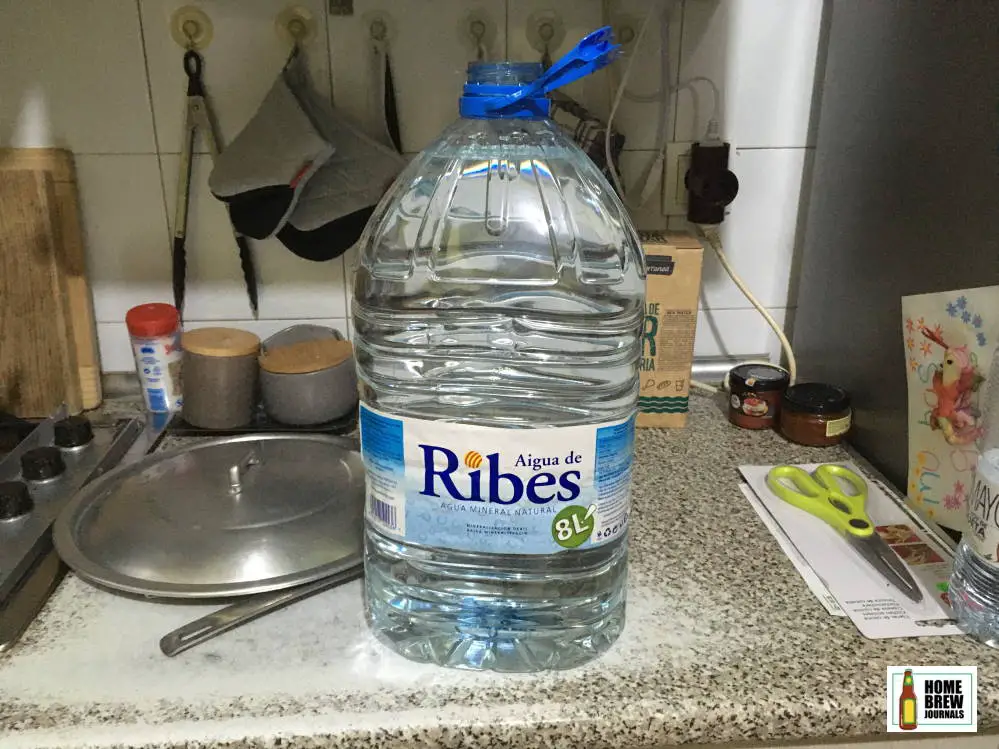Water is the main ingredient in beer and accounts for more than ninety per cent of the volume. So it’s fair to assume that the quality of the water used for brewing will affect the quality of the finished beer.
In this post, we look at the different types of water that are commonly available and answer the question: What is the best water for home brewing?
The best water for home brewing is bottled spring water which can be purchased cheaply at supermarkets and grocery stores. Alternatively, you could use tap water, although you may need to treat it to remove chlorine and other chemicals which are added to make it safe to drink.
More advanced homebrewers may decide to add carefully calculated quantities of minerals to bring out the flavour of the hops or create a more full-bodied flavour.

Choosing the best water for home brewing
1. Tap water
The cheapest and most readily available water for home brewing comes out of the tap, and if your tap water tastes OK, you may decide to use it to make beer.
The problem with tap water is that it usually contains chlorine or chloramine. Both of these chemicals are used to disinfect the water and make it safe to drink, but they do have a negative impact on the flavour.
When untreated tap water is used to brew beer, the chlorine creates chlorophenols, giving the beer an unpleasant medicinal flavour. Fortunately, chlorine and chloramine can be eliminated from tap water using Campden tablets (potassium metabisulfite).
If you’ve watched any home brewing videos on YouTube or visited brewing forums, you’ll have heard people talking about treating their tap water for hardness or adjusting the mineral profile. This is a more advanced technique and requires an up-to-date water report from the local water authority or a laboratory. Alternatively, you could test the water yourself using a kit like this one.
2. Springwater
The best water for home brewing is bottled spring water. Although it’s not quite as convenient as tap water, it’s still readily available at supermarkets and grocery stores and is pretty cheap.
Personally speaking, I live in an area with heavily chlorinated, very hard tap water and almost always drink bottled water. On brew days, I purchase two eight-litre bottles of spring water from my local supermarket, which cost about €1.50 each.
Bottled spring water is just that, water that has naturally filtered through layers of rock before emerging at a spring where it is collected and bottled.
The main advantage of using bottled water for brewing is that you don’t need to treat it to remove chemicals such as chlorine.
Also, once you get to the stage that you want to adjust the water profile to make it ideal for brewing a specific style or type of beer, you will usually find the water’s mineral profile on the manufacturer’s website. For example, I typically use this water for brewing.
3. Distilled, deionized and RO water
Distilled water has been evaporated and then condensed back into the liquid state. Distillation removes all the impurities and dissolved minerals from the water.
Deionized water and Reverse Osmosis water are similar to distilled water except that a series of filters are used to remove the impurities instead of evaporation.
Although at first glance, distilled, deionized and RO water may seem like they would be ideal for home brewing, they’re not usually recommended. This is because, unlike spring water, they lack the essential minerals which are necessary for yeast growth.
The only exception will be if you are brewing using an extract kit, in which case the dissolved minerals should already be in the malt extract.
Some homebrewers prefer to use distilled water as a starting point for creating the desired water profile. Effectively starting from scratch and then adding the minerals needed to create the ideal water for their recipe.
The minerals which are most commonly added to brewing water are calcium sulphate and calcium chloride.
If you decide to use tap water for brewing and live in an area with very hard water (lots of dissolved calcium and magnesium), you can soften it by mixing it with distilled water.
4. Rainwater
Rainwater is another water source that intuitively seems like it would be suitable for home brewing but, in reality, is totally unsuitable.
We all know that rainwater comes from clouds that have formed by evaporation, so you might expect it to be similar to distilled water. Unfortunately, the water becomes contaminated by pollutants such as NOx and CO.
Then there’s the issue of collection. The water that falls on the roof of your house and runs down the gutter becomes further contaminated with minerals, metals and plastics. Not to mention the countless microbes, algae and bacteria that live in the water butt. Although it may be suitable for watering your garden, these are not things that you would want to include in your beer.
If you want to reduce the environmental impact of your home brewing by avoiding plastic bottles, you are probably best of using tap water treated with Campden tablets.
